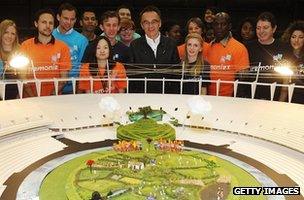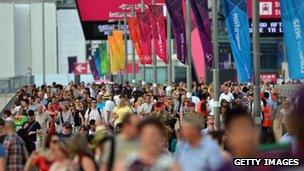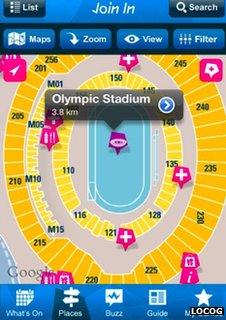Olympics put mobile communications technology to the test
- Published

Systems will be tested when spectators send messages and photos during the opening ceremony
Telecoms firms say their networks will cope with the strain of the hundreds of thousands of spectators, workers and athletes using mobile devices across London's Olympic Park in East London.
Thirty mobile phone masts have been fitted across the 500 acre (2,000,000 square metre) site, 14 of them for inside stadiums and other buildings.
In addition, BT says it has created the UK's largest single wi-fi installation.
Content providers have also taken steps to limit data usage.
The nine venues on site can hold more than 160,000 spectators at any one time.
Twenty thousand members of the media are expected, and the Olympic village houses about 17,500 athletes and officials. They will be joined by thousands more workers and security staff.
The chair of the the body representing UK mobile operators and content providers described providing coverage to the Olympic Games as being similar to dealing with four simultaneous FA Cup Finals over a 17-day period.
"At peak time when one set of spectators leaves and another arrives you will have between 200,000 to 300,000 people on site," Stuart Newstead told the BBC.
"It's as well prepared as it can be. The key to the planning has been co-operation between the operators to maximise the laws of physics, allowing a far denser configuration of masts and antennas than normal to ensure as much capacity as possible."
Organisers say that means that everyone should be able to make calls, send texts, browse the internet and upload material to social networks even at the busiest times.
Wi-fi vouchers
To relieve strain on 3G data services BT has installed about 1,000 wi-fi hotspots.
Subscribers to BT broadband, O2 mobile and Tesco Mobile will be offered free access.
Vodafone, Three, Everything Everywhere and other subscribers will have to buy vouchers ranging in price from £5.99 for 90 minutes to £39 for 4,000 minutes.
Overseas visitors are offered a rate of 500 minutes for £28.
BT says it expects to be able to handle peak traffic of 1.7 gigabits per second: the equivalent of 13,200 webpage downloads every minute.

Up to 300,000 people are expected to be on site at the Olympic Park at any one time
"The technology we have put in place is built specifically for events with a high density of spectators," said a BT spokeswoman.
"We have done a huge amount of capacity planning work, including reviewing and learning from events like the World Cup, Royal Wedding and the Super Bowl,"
Spectators are <link> <caption>forbidden from bringing in Mifi devices</caption> <url href="http://www.london2012.com/mm/Document/Documents/General/01/25/44/06/Prohibitedandrestricteditemslists_Neutral.pdf" platform="highweb"/> </link> or using their tablets and phones to create personal wi-fi hotspots to connect other devices.
Data management
Content providers whose material is likely to be popular with attendees have been asked to strike a balance between the kind of material they want to offer and its impact on data usage.
"The BBC's iPlayer will adjust throughput speeds [affecting video quality] depending on the capacity available because the broadcaster is working with operators to control that," said Mr Newstead.x
"We have also encouraged developers including the creators of Locog's [London Organising Committee of the Olympic and Paralympic Games] official app to gather as much pre-loaded information as possible before the user arrives at the site."
Mobile phone and computer users are not the only ones using the wireless spectrum.

The Join In app is designed to download data before the user arrives
Communications regulator Ofcom has licensed about 20,000 frequencies to allow:
Broadcasters to use wireless cameras, microphones and talkback systems
Olympic organisers to use wireless timing and scoring equipment
Olympic officials, team members, support staff and emergency services to have reliable communication systems.
To secure capacity it borrowed spectrum from the Ministry of Defence and has used frequencies freed up by the switch-off of analogue TV signals.
It says it will also have between 30 and 40 staff on site at any one time to check users do not suffer interference from either each others' equipment or deliberate jamming by malicious parties.
It also has spare frequencies that it can hand out to mitigate any problems.
- Published27 July 2012
- Published8 March 2012
- Published29 September 2011